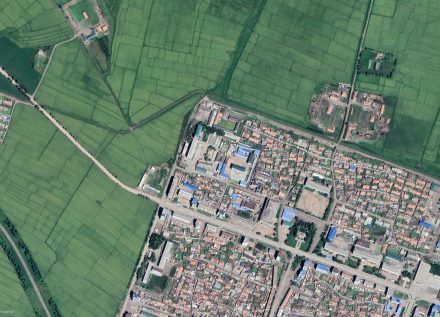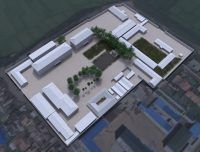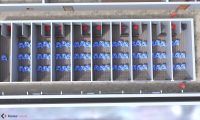A rare assessment of the penal system in North Korea
20th April 2022

Due to extreme secrecy and opacity in official information, very little is known about the penal system in North Korea. As the Human Rights Council considers the Report of the Special Rapporteur on the situation of human rights in the Democratic People’s Republic of Korea, and the European Parliament condemns the human rights situation in North Korea, we share this first assessment of its penal system.
Korea Future, a NGO, has embarked on the first of its kind investigation to shed light on the experiences of people detained in the country. In this guest blog for PRI, Hae Ju Kang, the organisation’s Co-Director, discusses their findings as published in their new database, North Korean Prison Database, giving insight into the system drawing on first-hand accounts.
A vast penal system extends across North Korea. Its facilities have capacity to detain hundreds of thousands of people in completete closed settings with no international oversight. Until now, little evidence had been gathered for the explicit purpose of holding accountable those implicated in crimes and violations within North Korea’s penal system. Rarer still was evidence that identified individuals responsible and linked them directly to cases where international law had been violated.
In the first phase of the most granular investigation ever conducted into North Korea’s penal system, Korea Future has identified 597 individuals linked to 5180 human rights violations committed against 785 detainees in 148 penal facilities. We interviewed 259 survivors, perpetrators, and witnesses; documented thousands of pages of testimony; and sourced internal documents and photographic and video evidence from inside North Korea as part of our ongoing investigation.


(Models of Onsong County MPS Detention Centre, Korea Future 2022)
We are making select evidence freely available at the North Korean Prison Database, a growing archive of international law violations that have transpired in the North Korean penal system. It is set up to support the work of legal practitioners, civil society organisations, researchers, and others.
It is our initial assessment that gross violations of international human rights law have been committed across the penal system, by state agents ranging from low-ranking correctional officers to superiors who failed to manage their subordinates. These include, but are not limited to: arbitrary arrest and detention; torture; widespread starvation; inhumane, overcrowded, and unsanitary conditions of detention; the denial of fair trial rights; pervasive sexual violence; unlawful forced labour; and death resulting from extrajudicial execution.
our evidence demonstrates a context, scale, and pattern of far-reaching violence that we believe may even amount to crimes against humanity
Our evidence demonstrates a context, scale, and pattern of far-reaching violence that we believe may even amount to the furtherance of a state policy that was first documented by a 2014 United Nations Commission of Inquiry; namely, systematic and widespread attacks targeting persons detained in the penal system that amount to crimes against humanity.
We are documenting how mass detention and penal violence are wielded indiscriminately against all categories of detainees — from persons who are alleged to have committed common crimes, including theft and assault, to those who are alleged to have committed so-called ‘political crimes’, including crossing into China or engaging in prayer. Even children are not being spared.
Our database documents human rights violations in a multitude of penal facility types including:
- detention centres (kuryujang) for persons undergoing pre-trial examination and for detainees who have been sentenced and are awaiting transfer;
- labour training camps (most commonly referred to as rodong danryondae or rodong kyoyangso, but also song danryondae), where detainees are sentenced to forced labour for 6-12 months;
- political prison camps (kwalliso or commonly referred to as chongchibom suyongso) where detainees, and occasionally up to three-generations of their family, are sentenced to life for political crimes; and
- Relief stations for homeless persons when regular penal facilities are at maximum capacity or under construction.
Background and context
First established under the Soviet Civil Administration in early November 1945, the North Korean penal system was a contemporary of the now infamous Gulag system of the Communist Party of the Soviet Union and the Laogai system of the Chinese Communist Party. Originally overseen by the Police Department of North Korea, its Prison Division took responsibility for managing the newly-formed country’s penal facilities and up to 8000 detainees. The Soviet Civil Administration Directorate’s final report in 1948 marks the last external account of detention from inside North Korea. From that moment, independent human rights monitors have been denied access and detainees have been forbidden from sharing their experiences upon release.
Under seven decades of rule by the Worker’s Party of Korea (WPK), North Korea’s penal system has grown to include hundreds of facilities under the responsibility of several state organisations. The Ministry of People’s Security (MPS), the Ministry of State Security (MSS), and the People’s Committee are prominent in this regard.
The MPS is analogous to a national police force in other nations, but serves a party-political function in North Korea due to it being subject to WPK control. It conducts law enforcement activities according to the criminal code and is directly responsible for 78 penal facilities documented in the North Korean Prison Database.
The MSS is an intelligence agency with an official mission to protect the Kim family and the political system by uncovering citizens and foreign nationals who engaged in espionage, anti-party, or anti-revolutionary activities — commonly termed ‘political crimes.’ It is directly responsible for 28 penal facilities documented in the North Korean Prison Database.
People’s Committees are administrative bodies that operate on the city/county, provincial, and national levels, overseeing labour training centres and other facilities. They are responsible for the management of 22 penal facilities documented in the North Korean Prison Database.
detainees are rarely afforded the right to legal counsel, but where legal representation does occur, this takes the form of state-assigned criminal defence lawyers (…) with a duty to the state and to political reporting, rather than to defending the accused
Each state organisation is associated with a system of sentencing. The first involves a public prosecution process managed by the MPS and the Prosecutor’s Office, according to the criminal code. Generally, persons sent to trial through the public prosecution process are heard before courts comprised of a prosecutor, a judge, a defence lawyer, and lay persons selected for their party loyalty. Detainees are rarely afforded the right to legal counsel, but where legal representation does occur, this takes the form of state-assigned criminal defence lawyers belonging to the Central Defence Attorney League, which is an organisational unit of the WPK with a duty to the state and to political reporting, rather than to defending the accused.
The second system involves in-camera trials managed by the MSS. Persons charged by the MSS for political crimes are tried only in the presence of select MSS state agents. Credible evidence of executions following these trials has been documented.
The third involves non-judicial Regional Security Committees who meet weekly and monthly to decide on administrative penalties for pre-trial detainees. These cases do not go to trial. Instead, administrative penalties that typically constitute 1-6 months of forced labour to be served at city or county-level labour training centres are commonplace.
Beyond the courtroom, public trials and public criticism sessions serve as further forms of punishment whose purpose is to signal the consequences of common criminal acts. Public trials are often held in stadiums, city or town squares, and other public locations. Public criticism sessions are overseen by provincial level authorities and gather citizens from local workplaces, People’s Units, and students, among others.
Accountability
Since the release of the United Nations Commission of Inquiry report in 2014, there have been various efforts relating to gathering evidence related to these state organisations for use in future accountability and justice. When establishing international crimes, such as crimes against humanity, it is necessary to distinguish between those who are responsible because they planned, prepared, or executed a crime, and those who are responsible due to their command responsibility for the actions of subordinates. Certain observations regarding North Korean chains of command are relevant in this regard.
The institutions responsible for managing penal facilities where systematic human rights violations have been documented — including the MPS, MSS, and People’s Committees — do not have standalone chains of command. One factor is related to internal guidance provided continuously by embedded WPK committees. This guidance is exercised over administrative entities and inside the facilities where direct perpetrators engage in the ground-level work of committing violations of international law.
Another factor is the granularity and extent of WPK control and influence over state agents, including over direct perpetrators, indirect perpetrators, and military or paramilitary leaders who may be investigated with regard to their command or superior responsibility because of their position in the administrative hierarchy. Indications of a systematic exercise of authority and power by committees and agents of the WPK suggest that it is a norm rather than an exception that unity of command is fractured in North Korea.
In the coming months and years, Korea Future will investigate and gather further evidence of violations of international law that transpire in North Korea’s penal system. In turn, we seek to deploy our evidence to support national and international actors who aim to protect the rights of persons deprived of their liberty and seek justice and accountability for the violations we document.
Explore one particular penal facility, Onsong County MPS Detention Centre, in this 3-D model and learn more in this video: